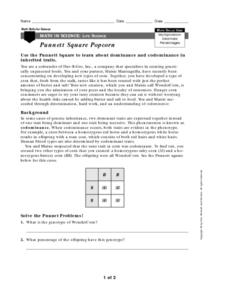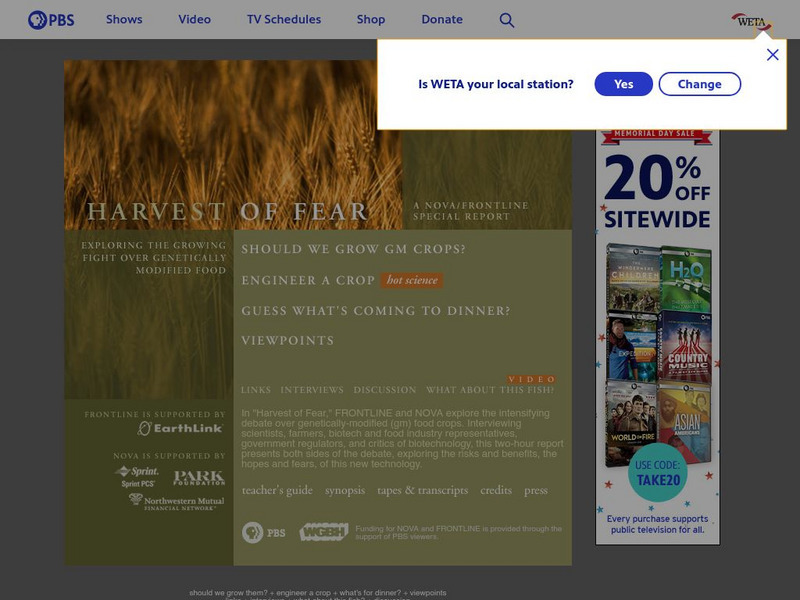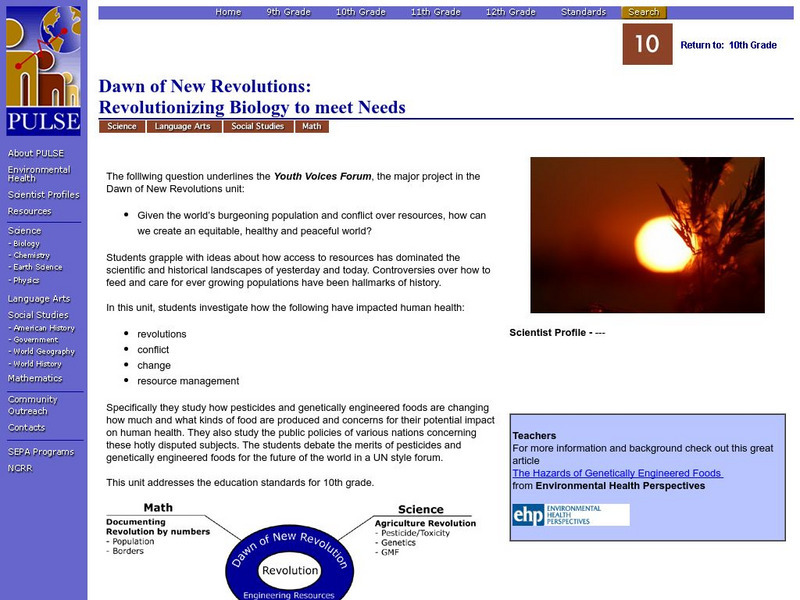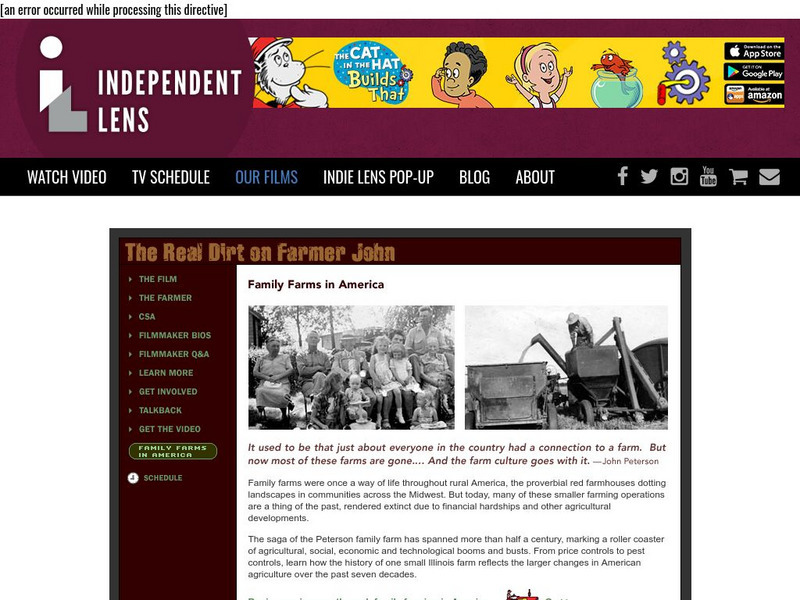Curated OER
How To Make Yeast Cells Thrive
Learners set up and run the experiments they designed in the lesson, 'Population Growth in Yeasts,' using simple yeast-molasses cultures in test tubes. They demonstrate understanding that several environmental factors can contribute to...
Curated OER
Punnett Square Popcorn
In this genetics worksheet, students use the Punnett Square to learn about dominance and codominance in inherited traits. This worksheet has 1 short answer question and 6 problems to solve.
Curated OER
The Challenge to Deliver Insulin
Students investigate these fundamental chemical and cellular processes. They recognize the long-term danger that comes from a diet of fast food, chips, and soda, realize that avoiding diabetes is their responsibility, and establish...
Curated OER
What is Biotechnology
Students discover the concept of biotechnology. In this biotechnology lesson, students explore the history of biotechnology and its implications today.
Curated OER
Cotton and Cabbage
High schoolers note how given traits could be achieved by selective breeding and by transgenesis. They identify different uses of GEO. Students recognize that the use of letters (Bt) before an organism's name means that the organism has...
Curated OER
Science: Designer genes
Students engineer new organisms using biotechnology. In small groups, they write procedures, list benefits and drawbacks, and explain how their new organism might affect the environment. After creating their new organisms, they present...
Curated OER
Taxonomy Project
Students act as a taxonomist and, given a certain situation, classify existing organisms.
Curated OER
Biotechnology Projects and Writing Assignments
Students research a subject about biotechnology and do a project or a writing assignment on it. They can pick from a possible eighteen different projects and five different writing projects.
Curated OER
Science and Technology Discussion Questions
With this science and technology discussion worksheet, students take turns asking each other five questions regarding their opinions about science and technology. Afterward, the class discusses any problems the students had with...
Curated OER
Chymosin Demonstration
Young scholars perform a demonstration which provides an example of the use of a protein produced by biotechnology for making ice cream, custard, and cheese.
Curated OER
Do we Really Need Wild Nature
Learners research challenges with which modern biotechnology confronts wild nature. Students collect articles that relate to biotechnology and the environment. Learners prepare a collaborative answer to the question, "Do we really need...
Curated OER
Field Of Beans
Students investigate the concept of crop farming. They plant small fields to test different theories of agriculture. Students keep care over the fields, including pest and weed control. Students make and record daily observations to...
Curated OER
Technology
Learners recognize descriptions of different types of biotechnology currently being used. They form persuasive arguments for or against that particular type of biotechnology.
eSchool Today
E School Today: Your Cool Facts and Tips on Genetic Engineering
Explains a basic concept in genetic engineering, i.e., the genetic modification of living things. Describes how it is done, how it differs from cloning, the benefits it offers, and the concerns people have about this practice.
Popular Science
Popular Science: Something Funny Down on the Pharm
This article investigates the growing industry of pharming, or genetically engineering and growing crops in order to produce pharmaceutical drugs. While there is huge potential for this industry, the article concentrates on the...
CK-12 Foundation
Ck 12: Life Science: Biotechnology in Agriculture
[Free Registration/Login may be required to access all resource tools.] The majority of the corn in the United States is genetically engineered. Corn syrup is used to sweeten many things, like Coke. Corn is also fed to the cows. Learn...
PBS
Pbs Learning Media: Engineer a Crop: Transgenic Manipulation
You're the geneticist now. In this interactive feature developed for the companion Web site for NOVA/FRONTLINE: "Harvest of Fear," use the latest in genetic technology to engineer your own "supercrop" of tomatoes.
Other
Ota: Genetic Engineering and Agriculture
A Q&A published by the Organic Trade Association (OTA) about genetically modified organisms (GMOs). This page expresses many doubts, concerns, and assertions about the use of GMOs in agriculture.
PBS
Frontline and Nova: Harvest of Fear
Review the risks, benefits, hopes, and fears associated with biotechnology and bioengineered food crops. Find in-depth interviews with genetic scientists, food industry representatives, farmers, and critics of biotechnology. Accompanying...
TeachEngineering
Teach Engineering: Dna Forensics and Color Pigments
Students perform DNA forensics using food coloring to enhance their understanding of DNA fingerprinting, restriction enzymes, genotyping and DNA gel electrophoresis. They place small drops of different food coloring ("water-based paint")...
PBS
Pbs Teachers: Scientific American: Dragon Science: Food for Thought
Investigate how geneticists use selective breeding to capitalize on hybrid vigor by using colored chips to represent traits in succeeding generations. Use Explain why farmers must buy new hybrid seed each year.
University of Arizona
Pulse: Dawn of New Revolutions
A cross curricular unit focusing on how much and what kinds of foods are produced because of pesticides and genetically engineered foods. Students will investigate the impact on humans due to the new technology in food production. Topics...
PBS
Pbs Teachers: The Real Dirt on Farmer John: Family Farms in America
Trace the evolution in American agriculture with this interactive timeline. Learn how the history of one small Illinois farm reflects the larger changes, decade by decade.
Other
Dna for Dinner?
This WebQuest is designed to help students answer the question, "Should genetically modified food crops be specifically labeled for consumers and why? In answering this questions students will also draft a law and explain their...























